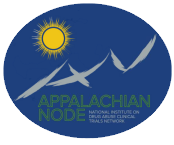News from the Nodes
Appalachian Node
 During a recent Appalachian Node Listening Tour, community partners indicated that protecting harm reduction services (e.g., syringe services programs, naloxone distribution) continues to be critical for limiting community transmission of HIV and viral hepatitis. Despite community and expert opposition, the West Virginia legislature passed SB 334 that places severe restrictions on syringe services that may result in many closures among the 16 existing programs. During a recent Appalachian Node Listening Tour, community partners indicated that protecting harm reduction services (e.g., syringe services programs, naloxone distribution) continues to be critical for limiting community transmission of HIV and viral hepatitis. Despite community and expert opposition, the West Virginia legislature passed SB 334 that places severe restrictions on syringe services that may result in many closures among the 16 existing programs.
Dr. Feinberg, multi-PI of the Appalachian Node, worked with a dedicated group of community advocates, physicians, and public health experts to provide testimony against the bill and to convince Gov. Justice to veto it, but it was signed into law on April 15. This will be very problematic as West Virginia has HIV outbreaks in its two largest cities, Charleston and Huntington, as well as scattered cases around the state, and a tremendous burden of hepatitis B (#1 in the U.S. for acute cases), hepatitis C (#1 or #2 in the U.S. for acute cases, depending on the year) and overdose fatalities (#1 in the U.S. for a decade).
The Appalachian Node recently launched their Quarterly Newsletter. Please email Appalachian.Node@pitt.edu to sign up for the mailing list.
Greater Intermountain
 Congratulations to Adam Gordon, MD, MPH, recipient of the 2020 HSR&D Health System Impact Award! This award honors HSR&D- and QUERI-funded research that has had a direct and important impact on clinical practice or clinical policy within the VA health care system -- and that has been successfully translated into VA’s policy or operations. Read more about Dr. Gordon and the award here! Congratulations to Adam Gordon, MD, MPH, recipient of the 2020 HSR&D Health System Impact Award! This award honors HSR&D- and QUERI-funded research that has had a direct and important impact on clinical practice or clinical policy within the VA health care system -- and that has been successfully translated into VA’s policy or operations. Read more about Dr. Gordon and the award here!
Western States
 The Western States Node, in partnership with the Big Southwest Node, is offering an Addiction Sciences webinar series for established and early career health services investigators. The series is held on the third Monday of each month at 11:00AM PST. The Western States Node, in partnership with the Big Southwest Node, is offering an Addiction Sciences webinar series for established and early career health services investigators. The series is held on the third Monday of each month at 11:00AM PST.
Our next speaker will be Dr. Noel Vest who will be talking about "Latent Class and Growth Mixture Modeling with CTN (and other) Longitudinal Data." Join via this Zoom link. |
Greater Southern California
 Congratulations to Sarah Clingan and Zhe Fei! Congratulations to Sarah Clingan and Zhe Fei!
Sarah Clingan, PhD, and Zhe Fei, PhD, are receiving the 2021 CPDD Early Career Investigator Award.
Dr. Clingan is a postdoctoral research fellow at UCLA Integrated Substance Abuse Programs (ISAP) working with Drs. Yih-Ing Hser and Larissa Mooney.
At CPDD, she will present on the impact of COVID-19 on the delivery of medication treatment for opioid use disorder from the perspective of substance use treatment providers.
Dr. Fei is an Assistant Professor In-Residence in the Biostatistics Department at UCLA. At CPDD, he will present on the impact of complex comorbidity conditions on survival of opioid use disorder patients.
Post-doctoral position: UCLA and Greater Southern California Node
The UCLA Integrated Substance Abuse Programs (ISAP) seeks a full time post-doctoral position who is in interested in interdisciplinary research on SUD topics, with an emphasis on experimental clinical trials to develop and test effective treatments for SUDs, especially opioid use disorder.
Duration of the fellowship is flexible, initially for one year, with possible extension. Salary will be commensurate with experience and capabilities.
The candidate will join a highly productive research team at UCLA including the CTN Greater Southern California Node, UCLA ISAP, and work with UCLA researchers and investigators on numerous clinical trials on SUD treatment, focus on blending clinical practice and research, as well as learn skills in advanced methodologies applicable to clinical trials.
Interested individuals should send a cover letter, CV, and contact information for three references to Yih-Ing Hser, Ph.D. (yhser@mednet.ucla.edu) and Larissa Mooney, M.D. (lmooney@mednet.ucla.edu).
UCLA is an equal opportunity/affirmative action employer. |